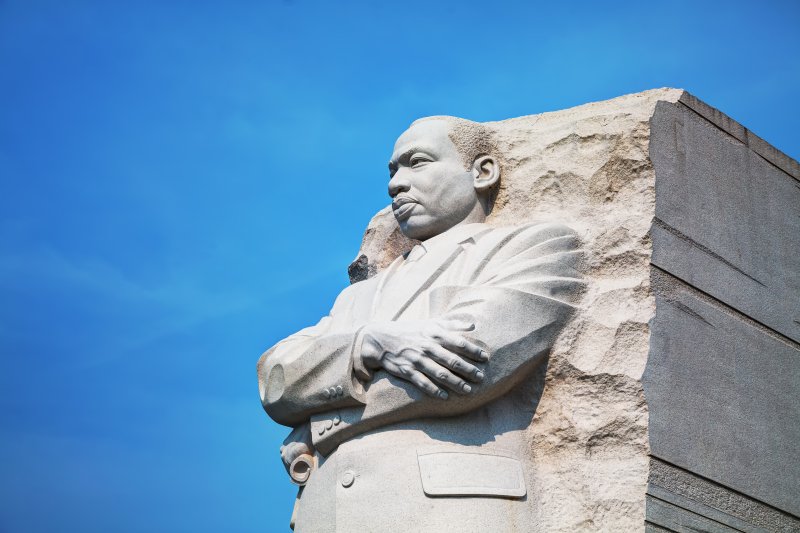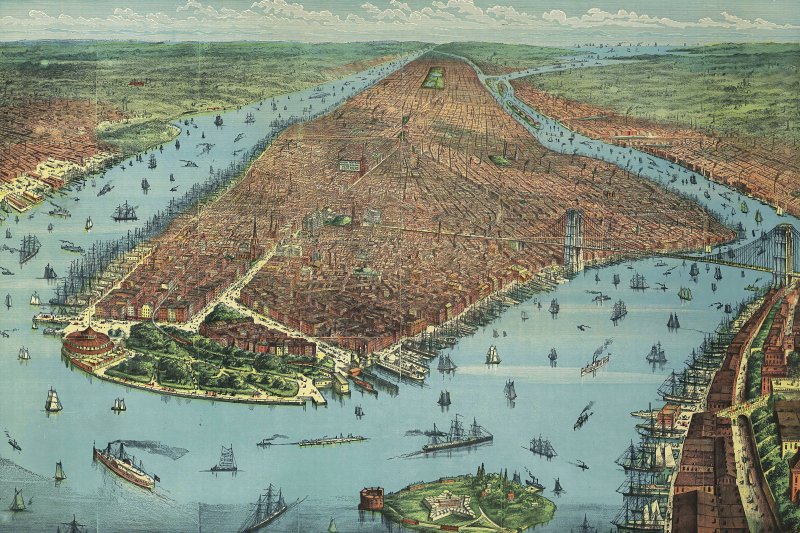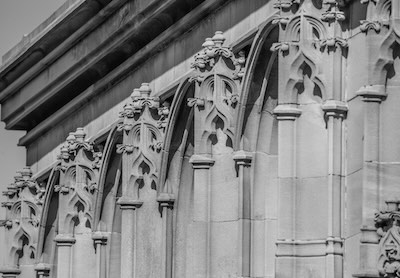
For Marsara Dunbar ’27, civic engagement is key to effective advocacy
At Civic Engagement Day, students learned how to get involved and connect with local opportunities.
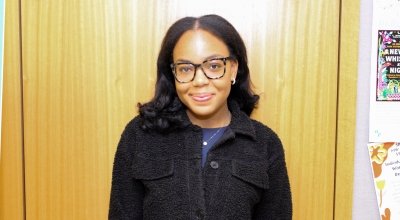
A 2024 United Way survey found that nearly 40% of college students regularly engage in activism or social justice work. In the same breath, the Institute for Citizens and Scholars found that while 57% of 18–34-year-olds reported being dissatisfied with American democracy, 33% had no intention of voting.
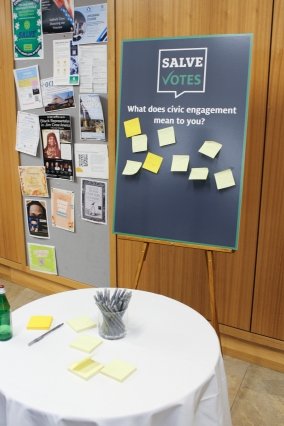
At Salve Regina University, we work to bridge that disconnect. Recognized as a most engaged campus for college student voting, we help you establish your voice and your power in the decision-making process that will shape your future. Those efforts were on full display recently at Civic Engagement Day on Nov. 11. The half-day program explored the question: “What does civic engagement mean to me?”
In a series of roundtables hosted by Salve faculty and community organizers from the greater Newport area, students built their understanding of grassroots movements, engaging during polarized times and ensuring representation amidst uncertainty. A networking social with local nonprofit organizations, elected leaders and community leaders gave them opportunities to learn about internship, volunteer and career opportunities.
Through participation in the SalveVotes coalition, Marsara Dunbar ’27, a political science major hailing from Minneapolis, Minnesota, was actively involved in organizing the event. She’s also a member of the Nuala Pell Leadership Program and on the executive board of the Black Student Union. We had a chance to sit down and talk with her about the event and the broader idea of civic engagement.
Q: You’re involved in many civic and leadership programs here at Salve. What started you on that road?
A: I’m passionate about advocacy, which came from seeing my mom’s work with immigrant communities and equitable health care. This prompted my involvement in several youth councils in Minnesota, where we got experience in advocating for young people, such as providing resources for students living in food deserts. I found it easy to hit the ground running as soon as I came to Salve. Attending the annual involvement fair and speaking with Salve staff members like Dr. Sami Nassim helped me see opportunities to get involved on campus.
These experiences inspired me to serve two years as a senator on the Student Government Association. It was gratifying to have my fellow students come to me about issues. I also served as a peer mentor at the Pell Center’s Summer Institute of Politics, and I’m a Nuala Pell Leadership Program fellow at the Pell Center this year.
Q: How did you come to be involved in Civic Engagement Day?
A: For last year’s Civic Engagement Day, it took the form of a Civic Engagement Fair where different clubs on campus picked a topic and engaged in conversation surrounding it. Our advisor for the Black Student Union, Olivia Jones, also leads the SalveVotes coalition alongside Katie Sonder, associate director at the Pell Center. She approached the Black Student Union with the opportunity, and we decided to research and present on voter suppression in BIPOC communities. After the fair, I talked more with Olivia about SalveVotes, and she invited me to join the coalition. Serving as a peer mentor for the Summer Institute of Politics and working closely with individuals of the Pell Center, the opportunity to plan Civic Engagement Day as a part of this coalition appealed even more to me.
Q: What was your role in Civic Engagement Day?
A: As a part of the SalveVotes Coalition, I was involved in planning the day’s events. We took time to learn more about what students want from this kind of event and were inspired to move from last year’s fair-style event with posters and tables and a lecture to something that mirrors an actual conference which featured more networking opportunities with local organizations and breakout sessions.
Q: Can you talk about anything or anyone at Salve that has helped/is helping you to become more involved in civic undertakings?
A: I mentioned Olivia Jones, the special programs and instruction librarian at McKillop Library, Dr. Sami Nassim, who directs the Office of Multicultural Programs, and my experience as a peer mentor for the Summer Institute of Politics, which introduced me to Katie Sonder and Dr. Jim Ludes, the vice president for strategic initiatives of the Pell Center. Being a Nuala Pell Leadership Program fellow has positioned me higher in my knowledge of what public service entails. Taking political science courses, more recently with Dr. Mary Anderson’s course POL299: Public Opinion, Media and Democracy, I have gained insight into how civic engagement can positively influence our democracy. Every encounter and conversation with these individuals has helped me to determine the best course of action to be a more informed and engaged citizen.
Q: Do you think it’s important for young people to learn more about political issues that affect them? To vote? Why?
A: I think it is absolutely crucial for young people to learn more about political issues and put it into practice. I attended the grassroots movements and community organizing roundtable discussion during the breakout session portion of Civic Engagement Day led by Gene Thompson-Grove of the League of Women Voters and Dr. Victoria Gonzalez. There, we discussed the importance of access and civic education for everyone. Removing the stigma or nerves around discussing politics at a young age helps people be more engaged with critical issues later. They’ll feel more comfortable discussing big issues in the classroom and beyond and will position them with an advantage at navigating and advocating for causes that are important to them in their lives. With this sense of comfort, youth will feel ready to approach the ballot with a critical lens and knowledge of issues beyond just the names on the ballot.
Q: Beyond voting, what other types of civic engagement are important to you?
A: Beyond voting, grassroots movements are something that comes to mind. Starting small – even if it’s just a group of peers – going out into the community, organizing and volunteering for a cause that makes a difference on an issue that is important to you. Knowing what you’re engaging with and relaying factual information to others in conversation is another way to help combat skewed perspectives on issues. Having an informed and respectful dialogue with members of my community to inspire participation in civics and democracy is a key aspect of civic engagement to me.
Q: Having a networking event with local organizations seems like a great way to get students involved in actual opportunities. Did you learn about any that you might pursue? Have you heard any other students say they made good connections there?
A: We met with one of our Newport city counselors, Stephanie Smyth, who shared her enthusiasm around creating an internship program with the city council for students to get exposure to local government. AmeriCorps and Jesuit Volunteer Corps representatives were also there to discuss their opportunities with students. Members of the League of Women Voters who were in attendance throughout the day’s programs and I witnessed a number of students in conversation with them. All of these opportunities piqued my interest, and after talking with other students, I heard that many of them were interested in working with the local organizations that were present.
Q: Do you think running for office is in your future?
A: I see myself doing some kind of advocacy work, potentially as an immigration attorney or in the international human rights space. I had an internship last summer with the U.S. House of Representatives working in the district office for Rep. Kelly Morrison, who represents Minnesota’s third congressional district. My work was heavily focused on case work regarding Medicare and navigating the immigration process for various constituent groups. During district work periods when the Representative would be in office, I had the opportunity to take part in community events and outreach. After this experience, I can envision running for elected office later in my career, either locally or maybe even the U.S. House of Representatives, especially, thinking about how polarized our political environment is – I’d like to help alleviate that polarization.
Q: Anything else you’d like to add?
A: I want to emphasize that civic engagement is not something that only political science students or those interested in politics should be interacting with. Civics impact everyone and it is evident in so many aspects of our daily lives. Action is vital to a smooth-running democracy; whatever action may look like is unique to you and your personal experiences and your interactions with others. However, it is important to keep an open mind when engaging in conversation and suspend your assumptions of others. This is one of the only ways polarization will truly be resolved. Holding spaces for students at Salve to get exposure to key issues and share stories and reflect on them was one of our driving forces for Civic Engagement Day. I’m glad to be a part of planning this event where we can inspire students to speak up and stay informed.
To learn more about the SalveVotes coalition and/or get involved, email Olivia.Jones@salve.edu.

